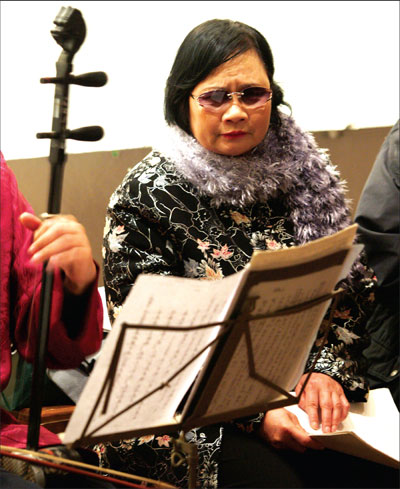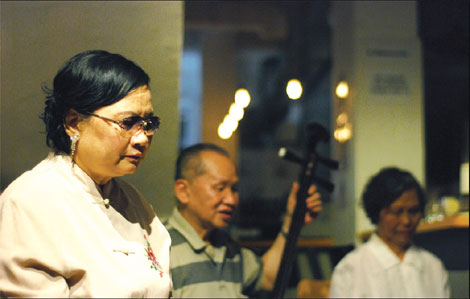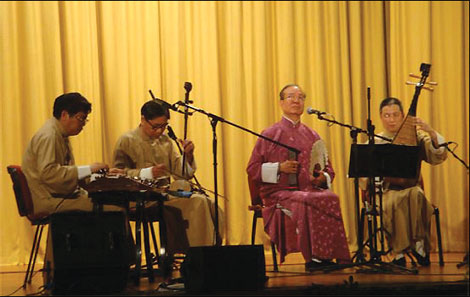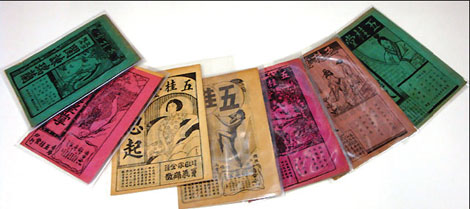Love of naamyam is blind
Updated: 2010-06-09 07:14
By Kane Wu(HK Edition)
|
|||||||||
|
Tong Siu-yin, the only female naamyam singer in Hong Kong, reads lyrics in braille during a performance at the Culture Club. Provided to China Daily |
|
Tong Siu-yin (left) sings naamyam in Kwong Po Wai's movie Autumnal Equinox. |
|
The typical staging of a naamyam performance includes one singer (in the pink gown) and three accompanists. |
|
Classic naamyam scripts preserved in the Chinese Music Archive in the Chinese University of Hong Kong. Kane Wu / China Daily |
It's not for multi-tasking iPodders with only 3-minute attention spans and a bigger appetite for power than pathos. But naamyam was once Hong Kong's most popular music. Kane Wu tells us why it all changed and how it's being kept alive.
Once it was Hong Kong's most popular form of entertainment. Naamyam, literally meaning "the music of the South" in Cantonese, was widely heard in brothels, nightclubs, and, more publicly, on the radio in the Pearl River Delta in the first half of the 20th century.
"Nowadays, I would say, there are fewer than 10 people who can sing authentic naamyam in Hong Kong," said Chan Hing-yan, a professor and composer in the Department of Music at the University of Hong Kong, who has dedicated his academic and artistic career to keeping naamyam alive.
"In the early 20th century a lot of brothels and tea houses had someone singing naamyam as entertainment. Some sang stories like everyday news. It was a kind of secular entertainment for the general public. These singers made so much money," said Chan.
Back in the fifties, Sonia Ng was a radio host. The era remains as fresh in her mind as if it were yesterday.
"The radio people invited several naamyam singers from the park and asked them to sing for the radio and produced naamyam programs. Rediffusion, Radio HK and later Commercial Radio all had a naamyam program," recalls Ng. But now there is no yesterday-once-more, for one day in 1964, the Beatles came to town and naamyam was swept away by the incoming tide of popular music.
Today, the traditional Cantonese narrative form, with its distinctive and trademark sentimentality, is struggling at the brink of extinction and would soon be gone altogether, save for a few dedicated souls who are trying to keep it alive.
"The Beatles came to Hong Kong in 1964, and it was overwhelming. All the young people switched over to that. All the radios were trying to lead the trend, so they started reducing the naamyam broadcasts. Then by the late 1970s, it just stopped, basically shut out. Hong Kong became economically very strong and all this Western music virtually displaced the old performing art," said professor Yu Siu-Wah of the Department of Music, Chinese University of Hong Kong. Displaced - but not entirely, if the determination and efforts of one very special naamyam singer are any indication.
Tong Siu-Yin was feeling nervous as she sat at the K.S. Lo Gallery, a tea house and museum in Hong Kong Park, waiting for her call to step before an audience at a concert Yu had helped to organize. She had taken up naamyam singing barely two years earlier and now the 40-year old was about to perform on stage with some of the top names in naamyam circles before an audience she could not see. Tong is blind.
"This is a song about a widow's reminiscence of her late husband," Tong said, clearing her throat before she began telling a typically naamyam-style wistful, sad story, in the song Fifth Watch of the Night.
The widow wakes up at midnight, walks to the balcony, recollecting the wonderful times she spent with her late husband under the moonlight. Accompanied by Chinese zither, yanqin (dulcimer played with a pair of thin bamboo sticks) and yehu (coconut-shell fiddle), Tong's voice struck a poetic tone. The lyrics are simple and rough, expressed in a tranquil, detached way, yet the sentiments are overwhelming with her calm narration and the gloomy melody.
Otherwise known as "blind man naamyam", this genre of naamyam combines speaking and singing. Traditionally, the majority of singers are blind and accompanied by men who are also blind.
Accompanists, although provided with music texts, are often required to improvise, adapting to the singer's flowing tones. The speaking part of naamyam lyrics is pure prose, while the singing part is rhymed poetry, mostly dated stories about ancient times.
The concert at KS Lo gallery, held on the first Saturday night of every month, is one of the few opportunities for naamyam lovers, mostly elderly people, to get to listen to the music live. The small-scale shows are always full-house performances, because all the concerts are free.
Except for Tong, all celebrated naamyam singers in Hong Kong are men over sixty.
"I'm the only female Naamyam singer. No female is learning how to sing Naamyam at the moment," said Tong, who has short hair and wears an iconic pair of blue sunglasses.
Even if someone wanted to study naamyam, there would be little opportunity, given the handful of authentic naamyam singers in Hong Kong.
The sunset of naamyam reflects an era when the pace of life is accelerating, attention spans are getting shorter and people don't have the patience to listen to long, time-consuming naamyam performances. Today's music appreciation, more typically is switching on an iPod to listen to pop tunes while simultaneously engaged in other activities. Sipping tea and listening to nostalgic songs of ancient times seems uninspired and quaint to many young people.
"I started to learn about naamyam because I had to do a project on Chinese traditional music," said Alex Yiu, a music student from Hong Kong Baptist University. "There are narrating art forms all over the country and naamyam is the only one that can represent Cantonese culture. The fact that it is fading away doesn't mean it has no value," Yiu added. Yet he admits that young people like him won't pay to see a naamyam concert. "It takes time for people to learn to appreciate the art. I don't think the younger generation has the patience," he said, suggesting that even the gallery's free-format performances cannot entice fidgety youngsters.
Naamyam performers and lovers believe their art is a precious Cantonese cultural tradition, so they are striving to keep it from becoming added to the long and growing list of extinct traditions and genres annihilated by the modern world.
But even if doomed to become a cultural relic, like fossils, naamyam will be expertly and lovingly preserved: Yu currently runs the Chinese Music Archive, a traditional music preservation project initiated some 30 years ago by his department. The dated naamyam scripts and original records of popular singers of long ago can be found in the archive.
The Chinese Music Archive receives donations, mainly from elderly people who are passionate about naamyam. But the funding, the space for the collections and the manpower to work on the project are far from sufficient.
Yu is also concerned about the shrinking number of naamyam performers.
"You can't imagine a young man or woman picking up this art to perform. What's popular in the market is the look when you dazzle and yell. It's not this kind of singing," he said.
Thus, Tong, the newcomer to the naamyam world, has become the hope for the future.
Having won several awards in the TVB and ATV opera competitions, Tong had, prior to that, already earned acclaim singing Cantonese opera. The daytime telephone operator stepped into the naamyam world quite by happenstance.
In 2007, Kwong Po Wai, an independent movie director was looking for a naamyam singer to play in his movie Autumnal Equinox, a love story revolving around naamyam, but he couldn't afford the fees for any well-known naamyam masters.
"So he came to me to sing Naamyam for his movie. Because of the movie I started learning Naamyam," said Tong.
Then Tong became popular. "I have had many shows at the Chinese University of Hong Kong, Hong Kong Baptist College and the Culture Club. Many people came to listen to the naamyam songs," said the rising naamyam star. She also performed at the 2010 Hong Kong Art Festival with two other female singers from Guangdong province and Macao, respectively. "I represented the Hong Kong naamyam scene in the festival," she said with pride.
Hugo Productions (HK) Ltd, one of the major disc production companies in Hong Kong, contacted Tong earlier this year for disc recording. "The boss heard my music accidentally and fell in love with it," Tong said. "So he approached me and helped me record a CD named Li Qingzhao, containing five songs, all about romantic yet heart-breaking love stories. Dozens of copies were sold during my performances at the Festival and at other venues."
Despite the striving of a few individuals like Tong, many are still skeptical about the future of naamyam.
Professor Chan of the University of Hong Kong fears that naamyam will remain a museumized art form. "For me as a composer, it's a pity that this kind of art is dying, but I also understand that each musical form has its own context. If the context is not there, we can't reconstruct the context. Are we going to rebuild brothels here? Are we going to change to the old lifestyle? I don't think it's possible," he said.
Yu, on the other hand, thinks that the survival of naamyam "depends on the consciousness of identity."
"I won't predict the death of Naamyam. As long as Cantonese is spoken, people will not totally forget their indigenous art," he said.
Director Kwong Po Wai, who presented the movie Autumnal Equinox in the 2008 Asian Independent Movie Festival, holds that naamyam should always be kept as a music option in the future.
"Naamyam to blind people is just like blues to the American Blacks. It gives them dignity and value. If some kind of music is there, why not give people more choice?"
As for Tong, she has sought new channels. "I have a Yahoo blog where I interact with my fans," said Tong. "I tell them my show schedules and many people approached me online, inviting me to perform." She recently had a street performance in front of the Hong Kong Art Centre. "The organizer contacted me on Facebook and I thought it was a great opportunity to let more people know about naamyam," she said.
Tong seems not to worry too much about the future of naamyam, and just has a good time in singing it. "It is too early for me to take in students. I myself still have a long way to go," she said. "Now I just want to sing better, and sing more new songs. You do realize since I started singing, more and more people have come to notice the existence of naamyam?" Given her talents, even and especially the blind can understand why.

(HK Edition 06/09/2010 page4)



